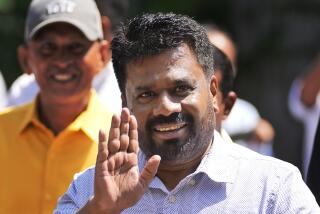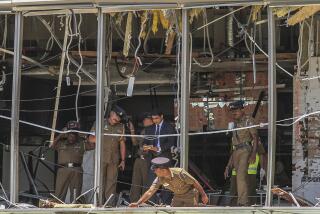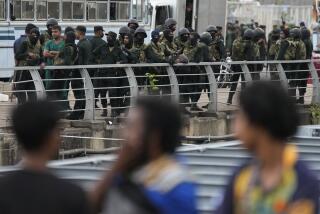‘I’m not leaving’: Sri Lanka’s ousted prime minister digs in as political crisis deepens
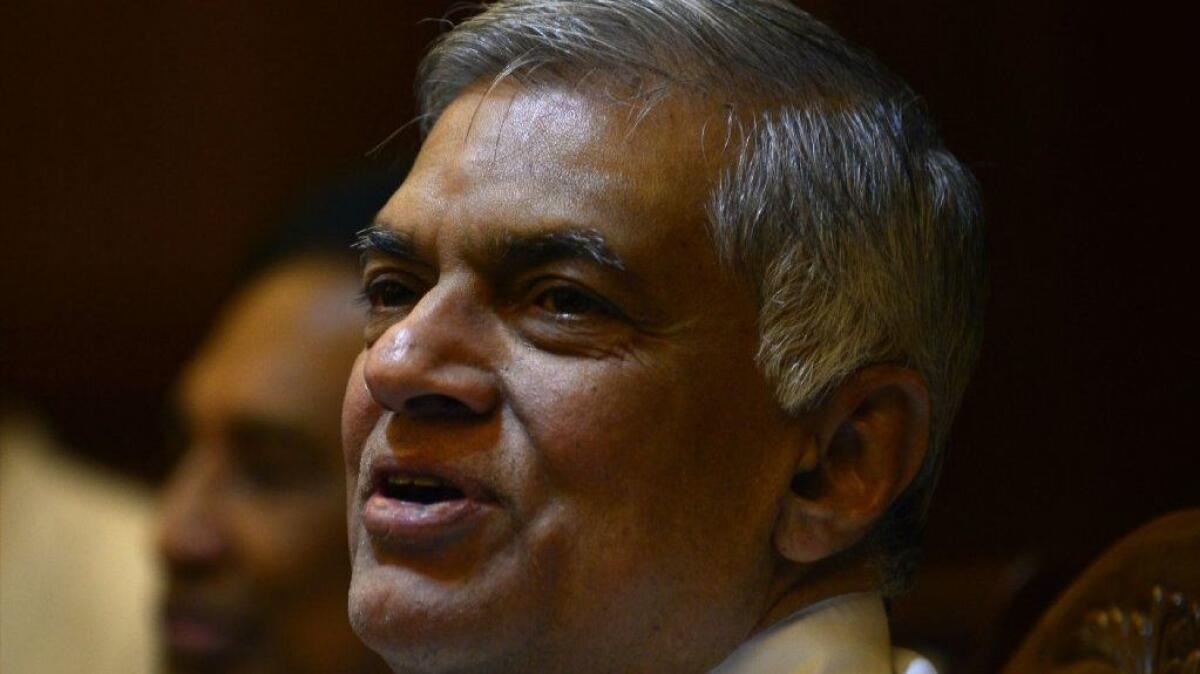
- Share via
Reporting from Colombo, Sri Lanka — With its graceful lawns, whitewashed colonnades and babbling fish pond, the colonial-era mansion known as Temple Trees doesn’t seem like a bastion of political resistance.
But as the official residence of the Sri Lankan prime minister, the compound has become a focal point in a messy, week-old crisis that has two men claiming the title and an uneasy island nation fearing a breakdown of democratic rule.
Ranil Wickremesinghe, who was abruptly fired as prime minister Friday, refuses to vacate the compound. He argues that Sri Lanka’s president violated the constitution by replacing him with the country’s polarizing former strongman, Mahinda Rajapaksa – and then suspended Parliament to block a vote that could have overturned the decision.
Facing protests and international pressure, the country’s president, Maithripala Sirisena, was reportedly considering reconvening Parliament before Nov. 16, when lawmakers were to resume their duties. Wickremesinghe – who survived a no-confidence vote in April – says he still has the support of a majority of the assembly, which would allow him to retain his post.
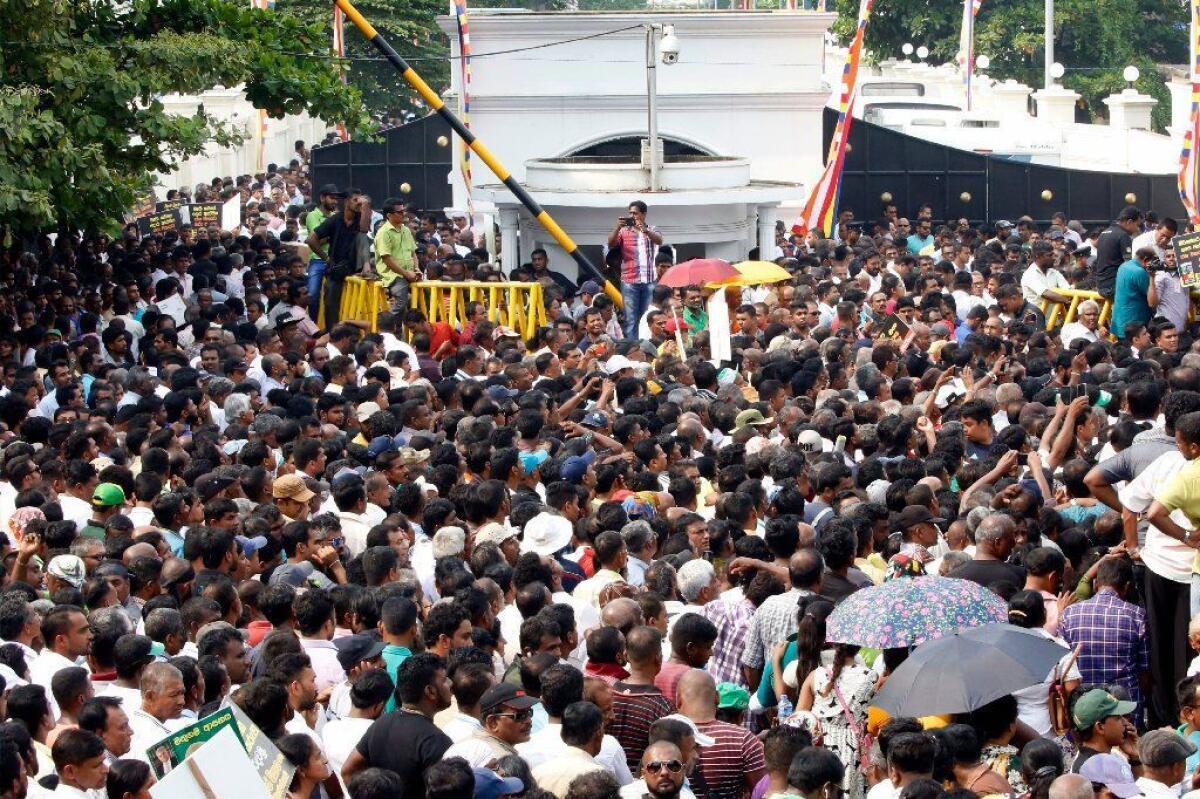
But Rajapaksa, working out of a separate mansion housing the prime ministerial offices, has begun appointing Cabinet ministers and working feverishly to bring lawmakers to his side.
About a mile away at Temple Trees, Wickremesinghe has dug in, huddling with supporters during the day and spending nights at a compound he previously used only for meetings.
“I wanted this to be the symbol of resistance, and we’ve achieved that,” Wickremesinghe said Wednesday, appearing relaxed on a white sofa in his office.
The patrician 69-year-old is not known as a brawler, and he acknowledged that his opponents assumed he would be gone by now.
He has been stripped of most of his security detail, but several dozen loyalists remain at the compound, checking visitors. Some Rajapaksa staff members arrived Wednesday to take an inventory of the offices, prompting a shouting match before the men were sent away.
“On Friday night, they were hoping that by Monday everything would fall into place,” Wickremesinghe said. “We’ve given time for people to mobilize. Now we have to create a much broader platform.”
A day earlier, he emerged briefly to address thousands who rallied peacefully outside Temple Trees, calling Sirisena’s actions undemocratic and demanding that Parliament reconvene. Many demonstrators said they turned out less to support Wickremesinghe – whose government had grown increasingly unpopular – than to object to Rajapaksa’s return to power.
The political standoff threatens to destabilize this country of 20 million, which in the last decade has struggled to emerge from a long sectarian war followed by Rajapaksa’s authoritarian presidency. One person died and two were wounded over the weekend when a pro-Rajapaksa crowd tried to block a minister from the dismissed government from entering his office, and the minister’s bodyguard opened fire.
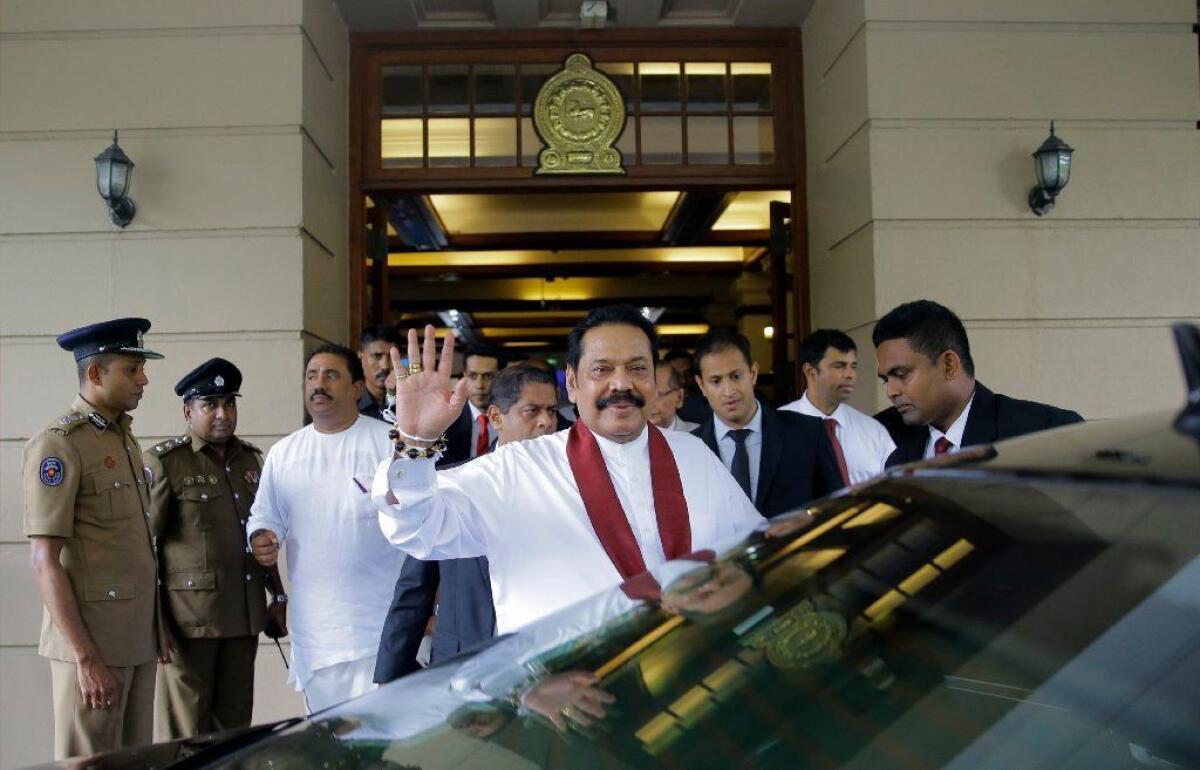
Less than four years ago, Sri Lanka was a bright spot among Asian democracies.
In January 2015 – after stifling the media, abolishing presidential term limits and allowing security forces to run roughshod over ethnic minorities and opponents – Rajapaksa suffered a surprise defeat at the polls to Sirisena, a member of his party and a former Cabinet minister.
Just as surprisingly, to many, Rajapaksa left office without a fuss. The departure of the ethnic Sinhalese nationalist raised hopes for postwar reconciliation with members of the Tamil minority and investigations into indiscriminate killings and abductions by security forces.
Hailing from different political parties and vastly different backgrounds, Sirisena, the son of a farmer, and Wickremesinghe came together on a platform that promised yahapaalanaya – corruption-free governance – and accountability for wartime abuses.
Their unlikely coalition’s first several months saw progress. Parliament approved a constitutional amendment that reduced presidential powers, press freedoms were restored, space for political discourse opened up and the military returned some of the vast lands it seized during the war years.
Relations with the United States, India and other traditional allies – which had soured as Rajapaksa embraced Chinese loans for questionable infrastructure projects – improved substantially.
But when it became clear that the government would not prosecute Rajapaksa, his powerful family members or top allies for corruption or other major crimes, minority Tamils and reform-minded Sinhalese who had backed Sirisena grew disillusioned.
Analysts say that neither man was eager to pursue Rajapaksa, despite their professed antipathy for the former president. Sirisena once claimed Rajapaksa was trying to have him killed, but his only path to retaining power seemed to hinge on the support of Rajapaksa’s Sinhalese base.
And Wickremesinghe had an interest in keeping Rajapaksa alive politically in order to keep Sirisena from growing too powerful, said Alan Keenan, a senior analyst with the International Crisis Group.
“They were not serious on corruption,” Keenan said. “The political class may be bitter rivals for elections, but in practice there are multiple interconnections and overlapping allegiances.”
Wickremesinghe defended the government’s decision not to seek criminal cases against Rajapaksa – even though the ex-president’s comeback has come at his expense.
“We decided that there can be parliamentary investigations, there can be commissions of inquiry, but they were not to be harassing him,” he said.
“He was the former president and he handed over power in accordance with the mandate of the people, so let it be.”
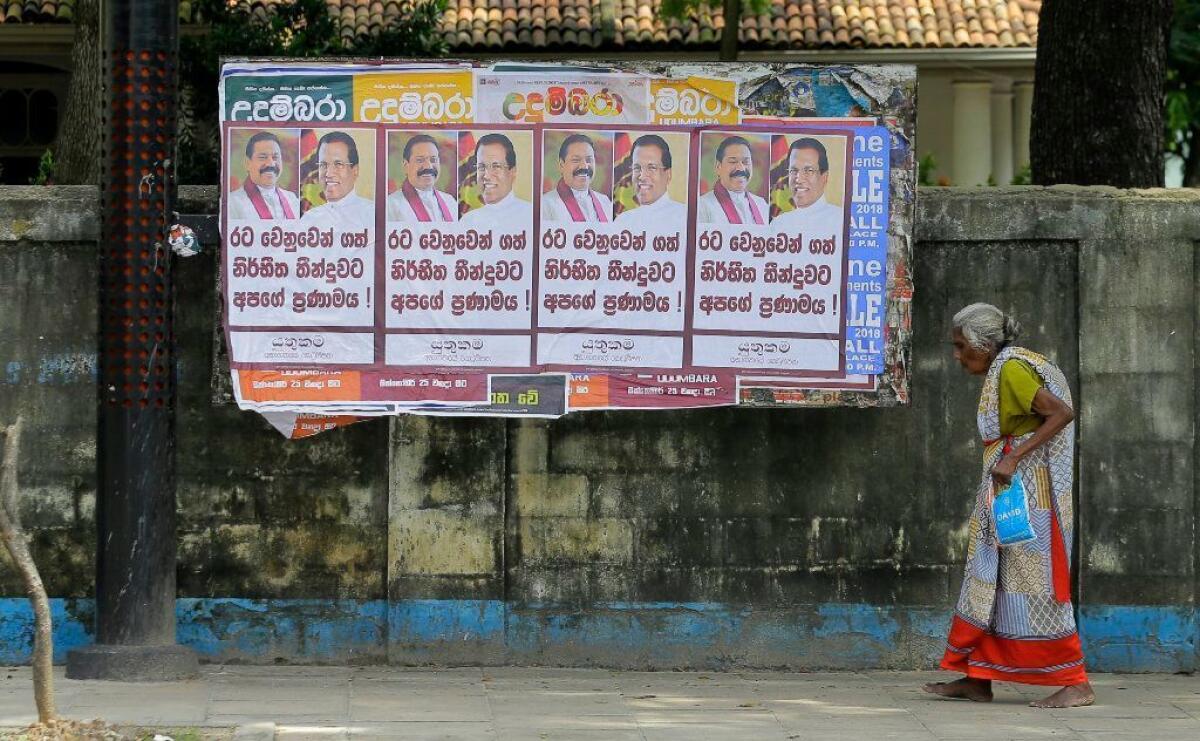
Wickremesinghe got into deeper trouble over a scandal involving treasury bonds that allegedly cost the government tens of millions of dollars while a friend of his was serving as central bank governor.
While Wickremesinghe appeared before investigators and has not been charged with wrongdoing, the case badly damaged the government’s anticorruption message.
“I willingly went to the commission to testify,” Wickremesinghe said. “There is nothing more.”
The scandal contributed to a financial crisis in Sri Lanka, which is struggling to repay loans to China and other debt. The political uncertainty has worsened the economic crunch, driving the currency, the rupee, to a record low against the dollar.
But the impasse has benefited Rajapaksa, who is believed to have amassed a fortune while in office, and has been able to persuade at least five members of Wickremesinghe’s party to defect and join his government as ministers.
Transparency International said Wednesday that the suspension of Parliament – while neither Rajapaksa nor Wickremesinghe has a clear majority – has created a climate in which lawmakers can be bribed to switch sides.
“In the context of the prevailing political culture and past experiences, closing the doors of Parliament to enable deal-making has already led to allegations of monetary inducements for loyalty,” said Asoka Obeyesekere, the executive director of the anticorruption group’s Sri Lanka office.
Wickremesinghe said members of his party were meeting with Rajapaksa and his allies and being offered “big amounts” – upward of $1 million – to join his government. Keheliya Rambukwella, a spokesman for Rajapaksa’s government, responded that the lawmakers “have made a decision in line with their conscience to cross over.”
There were other signs, too, that Sri Lanka was sliding back to the old days. Trade unionists loyal to Rajapaksa stormed the offices of state-owned media last week, ordering changes to the front page of a newspaper and briefly forcing a TV channel off the air.
Western diplomats believe that the more time passes, the harder it will be for Wickremesinghe to muster a majority. But Wickremesinghe said he remained confident.
“I’m not leaving,” he said. “The fact that Parliament is not convening, it means we have a majority. The whole question is whether this is a legitimate government. You can sit down at a desk, but that does not make you legitimate.”
Special correspondent Munza Mushtaq contributed to this report.
Shashank Bengali is South Asia correspondent for The Times. Follow him on Twitter at @SBengali
More to Read
Sign up for Essential California
The most important California stories and recommendations in your inbox every morning.
You may occasionally receive promotional content from the Los Angeles Times.
